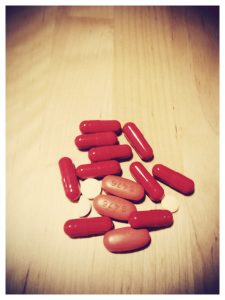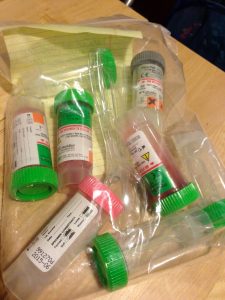Emily’s Clinical Trial Journey
Emily, like so many Crohn’s patients, has struggled with symptoms on and off for several years. She’s tried nearly every approved medication available, and on top of the everyday pain of dealing with disease, she’s got the added anxiety of feeling like she’s running out of options. Emily’s decision to enter a Crohn’s clinical trial comes from both her willingness to seek out another option, and her desire to contribute to research.
Patients’ participation in drug trials are part of the Clinical Study portion of the FDA approval process, which includes 3 phases. Each progressing phase includes a greater number of trial patients, so the majority of experiences are part of Phase 3. This phase looks at effects on a larger population including demographics, considers side effects, and often uses drugs in combination with others. Previously, during Phase 1 and Phase 2, safety and effectiveness have already been tested.
Hope for a ‘Very Challenging Patient’
I was first approached by my GI doctor to participate in a clinical trial for Crohn’s Disease. He described me as a ‘very challenging patient’ due to the fact that I had built up antibodies to almost all biologic therapies, and had failed other conventional treatment. His suggestion was to do some research online and make a decision.
 Deciding to take part in a clinical trial is a very personal journey. It’s not for everyone. Most patients are already feeling terrible and having weekly tests like blood draws, EKGs, and others. Adding on a new, unknown medication can be tough both physically and mentally. When I decided to consider a clinical trial, I had exhausted most conventional medications currently on the market. That’s a scary reality for far too many patients.
Deciding to take part in a clinical trial is a very personal journey. It’s not for everyone. Most patients are already feeling terrible and having weekly tests like blood draws, EKGs, and others. Adding on a new, unknown medication can be tough both physically and mentally. When I decided to consider a clinical trial, I had exhausted most conventional medications currently on the market. That’s a scary reality for far too many patients.
I went to the Crohn’s and Colitis Foundation’s site and found it to be super helpful or searching local clinical trials. I found one that seemed like a good fit and started on the process. To be totally honest, I was nervous at first and afraid of the unknown; afraid of what would happen to my body, all the blood draws and tests, and any side effects that might occur.
The Patient and the Process
A clinical trial is navigated by your doctor and you. You may start the conversation with your doctor, or he or she may bring it up to you. You can start finding trials by going to clinicaltrials.gov or by using the Foundation’s search page. Registration is required for clinical trials involving drugs, biologics, and devices, and each trial has a list of inclusion and exclusion criteria. Criteria can include basic things like your age or gender, to things like your CDAI score, surgical history, and other detailed qualifications set out by the clinicians involved in the trial.
However, during the screening process, I realized it was not easy to even get into a clinical trial. Sometimes the trial parameters are so narrow that most patients don’t fit. It was at this time that I told myself, ‘If I am accepted I have to do this‘, and while I realize this was a huge decision that probably comes hard to most patients, it was as simple as that for me. I am doing this for others, I am only one tiny part in this puzzle.
In my initial meeting, I received a 20+ page document explaining what I would be on, and what would happen each week. During this visit, I also met my study coordinator and doctor.
I fell in love with my doctor’s quest to help patients, and it was quite infections. The drive to learn more and benefit the patient population at large, and the passion to helping others find relief or remission were two important factors for me, and I realized that I could use my own situation to do something greater than just treat my own disease.
With starting a new drug, you always hope it will help your symptoms, as I did. But this was different. During the past year and through my involvement with Team Challenge, I had so many faces of IBD in my life to put the struggle to. I heard story after story, all heartbreaking, all of people struggling with no end. Of 6-month-old babies being diagnosed with Crohn’s. Of people getting full organ removal and living with a bag. These are unimaginable struggles that most don’t realize, outside the IBD community.
Trials Benefit Patients, and Populations
Clinical trials have been vital in bringing new drugs to market, through which they have positively impacted and saved millions of lives. They aren’t just arbitrary human experiments, they go through meticulously planned stages to hone in on the benefits and risks, with the goal of finding treatments that directly help patients.
Read more on the importance of clinical trials.
With my study drug, I am able to continue my current medications for Crohn’s, which was a relief to me. Some trials will have you stop your current treatment altogether, which is stressful in itself. The study doctor also ensured me that if I continue to not improve, he would remove me from the trial. In his words, no trial or amount of money is so important to put yourself at grave risk. He was amazing at explaining the patients’ well being always comes first, and the scientific outcome second.
 My trial will last for a year, unless I start to develop side effects too great to continue on. For me, not only was this a chance to take a new drug, but also to work with one of the most talented doctors in the state. He reviews my CDAI and symptoms weekly, and also took into account my primary GI’s notes, providing a valuable second opinion on my disease and treatment plan.
My trial will last for a year, unless I start to develop side effects too great to continue on. For me, not only was this a chance to take a new drug, but also to work with one of the most talented doctors in the state. He reviews my CDAI and symptoms weekly, and also took into account my primary GI’s notes, providing a valuable second opinion on my disease and treatment plan.
If you are in a clinical trial and the drug is in the final stage (3 or 4) of testing, most companies will open what is called an “Expanded Access” study where you can continue taking the drug until it is approved by the FDA. There are also uses for treatments that are not FDA approved, called “Compassionate Use”. If the study ends and you and your doctor believe you have received benefit, he or she can talk to the pharmaceutical company to supply the drug on this basis.
For me, the efforts of driving back and forth, embarking on a trial drug, everything I went through, it was worth it to contribute to finding out more about IBD and treatments, and to help others. In the bigger picture of all the patients out there suffering and desperate for remission, my risks seemed like nothing. I would definitely recommend others participate in clinical trials, and although being nervous is probably normal, it’s so important to the greater knowledge of Crohn’s and Colitis.
Clinical trials will include an informed consent, and participation is voluntary, so you are able to withdraw at any time, such as if you don’t feel like you are benefitting, or you are experiencing side effects. The FDA regulates that your decision to participate or not cannot affect your regular medical care. If you feel that your study team is pressuring you to go on, you have the right to file a report to the hospital representative or review board.
Part of My Healing Process
Let’s be real here – most patients taking drugs for IBD have a host of terrible side effects, that can even affect totally separate systems of the body, like your bone marrow, liver, and even blood, as well as things like nausea, vomiting, and being more susceptible to everyday colds and stuff. Are those the drugs we have to choose from? There has got to be something better, there are better options out there but patients need to be involved to get there. Better yet, there may be a cure out there but we will never know until we go after it.
In the last year, I have started to think of my Crohn’s differently. I now know I have this for a reason, and although some days are very much a struggle, I need to act. I have it within my power to act. I need to help others in as many ways as I can, and this is just one small way. I don’t want anyone to have to go through what us ‘soldiers’ do every day.
When I started this journey, I thought I was looking at just another option for myself, but now I realize that it’s way more important than just me as an individual, it’s the least I can do to make things better for other patients in the future. IBD changes you to the core and leaves scars that can never be fully healed.
Part of my healing process is trying to help find a cure so the children of tomorrow don’t go through what we do today.
Emily is a long-term Crohn’s patient and multiple time finisher of the Crohn’s and Colitis Foundation’s Team Challenge endurance program. She lives out west where she spends a lot of time in the beautiful outdoors.
